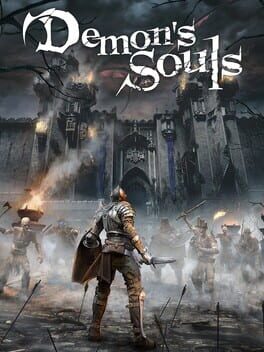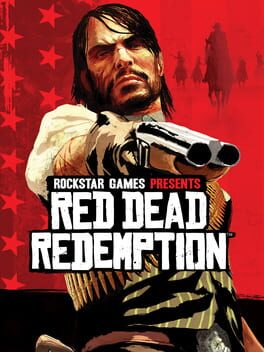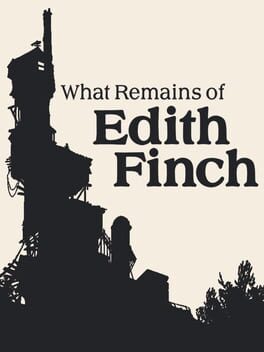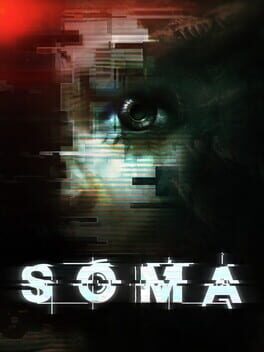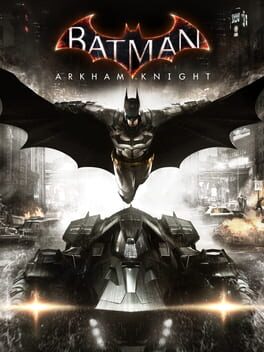ryara
Favorite Games
013
Total Games Played
002
Played in 2024
057
Games Backloggd
Recently Played See More
Recently Reviewed See More
This review contains spoilers
For context, I never played the original Demon's Souls, so I don't have a point of reference to make comparisons between the two versions (and, thus, can't really comment in-depth on the artistic/stylistic changes other reviews have mentioned). I will say, however, that it's a shame that the original game's muted colors and muddied presentation have been overhauled for the sake of graphical fidelity, and there's an important conversation to be had about the gaming industry's obsession with remakes that emphasize pixel count over artistic integrity.
When judged on its own merits, I found DS to be flawed but, overall, a good time. As mentioned above, I found the game's presentation to be a bit soulless (ha). From a graphical perspective, everything looks amazing, but the level of polish in the presentation makes the world feel fake. I never really bought that Boletaria is a real, lived-in place; everything felt too video gamey and too crisp. Like I said, I've never played the original DS, but I think other commenters have done a great job discussing how much of From's artistic voice was lost in this remake.
Despite being very light on the lore, I think DS' core story asks some interesting questions and is a compelling analysis of the relationship between systemic power and people. The central mystery - why would King Allant, who ruled over an already prosperous nation, choose to awaken the Old One? - was particularly well-developed, and it's ultimate answer - that Allant, a man who had everything, still felt the need to amass more power to fill an emotional hole inside himself - felt particularly relevant to the current state of the world. While I found the supporting cast to be less memorable than other From games, there were still some compelling moments and interesting ideas: Ostrava's tragic search for answers about his father, the ideological clash between the Old One-worshiping clergy and marginalized magicians, the Golden Monk's oppression of Latria, Astraea's doomed humanitarian mission, and the Monumental potentially allowing the Old One to awaken as a false flag operation to increase the population of its kind, to name a few. Boletaria and the clergy's search for power and dominance over neighboring nations and spellcasters respectively destroyed this world long before the Old One awoke and, considering DS ends with the player character either perpetuating the cycle (the Old One goes back to sleep, the player character becomes a Monumental, and no one learns a thing) or succumbing to the Old One's power sought by so many other characters, the game ends with no indication that things will get better. All of this is to say that DS has a great, compelling story that more than lives up to the rest of From's catalogue.
The game largely plays very similar to many other From games and felt polished the whole way through. I wasn't really a fan of the world tendency system, missed having access to automatically replenishing healing a la flasks, and would've preferred an interconnected world, rather than a series of disparate levels, but DS includes several great areas (with 1-1, 1-3, and the entire Tower of Latria being particular standouts) and a few great bosses (I particularly loved Penetrator, Flamelurker, Astraea, Allant).
By its own merits, DS is a strong video game. I want to end by echoing the sentiment that it's a real shame this game will, likely, render the original DS obsolete, especially when considering the significant artistic vision lost between these two versions. I don't love the industry's current obsession with remaking games and sacrificing artistic vision with graphical polish and, for all this game does well and for the overall good time I had with it, I also hope we don't keep seeing more games with the same design philosophy as this one.
When judged on its own merits, I found DS to be flawed but, overall, a good time. As mentioned above, I found the game's presentation to be a bit soulless (ha). From a graphical perspective, everything looks amazing, but the level of polish in the presentation makes the world feel fake. I never really bought that Boletaria is a real, lived-in place; everything felt too video gamey and too crisp. Like I said, I've never played the original DS, but I think other commenters have done a great job discussing how much of From's artistic voice was lost in this remake.
Despite being very light on the lore, I think DS' core story asks some interesting questions and is a compelling analysis of the relationship between systemic power and people. The central mystery - why would King Allant, who ruled over an already prosperous nation, choose to awaken the Old One? - was particularly well-developed, and it's ultimate answer - that Allant, a man who had everything, still felt the need to amass more power to fill an emotional hole inside himself - felt particularly relevant to the current state of the world. While I found the supporting cast to be less memorable than other From games, there were still some compelling moments and interesting ideas: Ostrava's tragic search for answers about his father, the ideological clash between the Old One-worshiping clergy and marginalized magicians, the Golden Monk's oppression of Latria, Astraea's doomed humanitarian mission, and the Monumental potentially allowing the Old One to awaken as a false flag operation to increase the population of its kind, to name a few. Boletaria and the clergy's search for power and dominance over neighboring nations and spellcasters respectively destroyed this world long before the Old One awoke and, considering DS ends with the player character either perpetuating the cycle (the Old One goes back to sleep, the player character becomes a Monumental, and no one learns a thing) or succumbing to the Old One's power sought by so many other characters, the game ends with no indication that things will get better. All of this is to say that DS has a great, compelling story that more than lives up to the rest of From's catalogue.
The game largely plays very similar to many other From games and felt polished the whole way through. I wasn't really a fan of the world tendency system, missed having access to automatically replenishing healing a la flasks, and would've preferred an interconnected world, rather than a series of disparate levels, but DS includes several great areas (with 1-1, 1-3, and the entire Tower of Latria being particular standouts) and a few great bosses (I particularly loved Penetrator, Flamelurker, Astraea, Allant).
By its own merits, DS is a strong video game. I want to end by echoing the sentiment that it's a real shame this game will, likely, render the original DS obsolete, especially when considering the significant artistic vision lost between these two versions. I don't love the industry's current obsession with remaking games and sacrificing artistic vision with graphical polish and, for all this game does well and for the overall good time I had with it, I also hope we don't keep seeing more games with the same design philosophy as this one.
This review contains spoilers
This was my first time visiting RDR and, while I had my share of problems with the game, I definitely understand why this one's so beloved. The world is really impressive and still (mostly) holds up, despite the number of iterations the open world genre has gotten since 2010, and the story does a lot of things right and is a (again, mostly) genuinely well-done deconstruction of Wild West fiction.
With all that said, I think RDR's biggest issue is it's insistence on adhering to arcade-style video game design while also trying to tell a serious story. This game is full of immersion-breaking moments where, one minute, John will be reflecting on his violent past and desire to peacefully settle down and leave his outlaw days behind... and, during the next, he'll be sitting on a minigun mowing down waves of enemies. RDR can't decide if it wants to be a fun romp through the Wild West or a serious story breaking down Wild West romanticism, and the tonal whiplash between these two extremes often left me feeling disoriented and confused. I wish the game had been willing to do away with its traditional mission structure, shooting galleries, and other glaring reminders that I'm playing a video game and fully committed to its storytelling. It felt like Rockstar was worried they couldn't hold their audience's attention without throwing in a shiny action setpiece every half hour.
It's a real shame too, because when RDR's good, it's really good. I think the story has some pacing issues - the New Austin section goes on for a bit too long and, despite serving as necessary worldbuilding, doesn't really move the plot forward much - but the Mexico arc's meditations on power and, of course, the tragedy of the outstanding third act and epilogue are some great storytelling. John is a wonderfully tragic protagonist, and both his ultimate fate and the fact that his son, who he wanted to grow up free of the influences of John's outlaw past, looks like he's going down the exact same path as his father is bleak and serves as a great bookend to the story's message that, for as much as America changes, it refuses to allow its people to change and grow. I do wish that the secondary characters had been given arcs as fleshed out as John's, and some of the side character goofiness (e.g. Seth, West Dickins) created some weird tonal clash, but overall, RDR's story was well-done. I also wish that the game had explored the indigenous side of manifest destiny in more death - the short arc with Nastas was well-done, and it's tough to tell a complete story about the West without analyzing relations between the settlers and indigenous groups - but that's more personal taste than anything.
The world's a bit empty, but looks surprisingly beautiful; I particularly loved Mexico's vistas. I wish there'd been a bit more incentive to explore the world (maybe some of the better guns are hidden in chests, rather than sold in shops? maybe there's more rare animals to hunt?), but I think the open world holds up really well. The presentation in general was really impressive for such an old game, and the music is really great the entire way through.
Gameplay was fine. Nothing to write home about, but the gunplay was functional, and the dead eye system leads to some really cool, satisfying moments. There's a bit of jankiness to John and the horses (e.g. horses often don't come directly to you when called, John moves around a bit stiffly, etc.), but it wasn't ever any worse than a mild annoyance.
Anyway, RDR's a good time overall! It definitely got me more excited and curious to play RDR2 (which, as I understand, tells the story of how Dutch's gang collapsed), especially if the prequel updates some of the jankier, more outdated systems found in the first game.
With all that said, I think RDR's biggest issue is it's insistence on adhering to arcade-style video game design while also trying to tell a serious story. This game is full of immersion-breaking moments where, one minute, John will be reflecting on his violent past and desire to peacefully settle down and leave his outlaw days behind... and, during the next, he'll be sitting on a minigun mowing down waves of enemies. RDR can't decide if it wants to be a fun romp through the Wild West or a serious story breaking down Wild West romanticism, and the tonal whiplash between these two extremes often left me feeling disoriented and confused. I wish the game had been willing to do away with its traditional mission structure, shooting galleries, and other glaring reminders that I'm playing a video game and fully committed to its storytelling. It felt like Rockstar was worried they couldn't hold their audience's attention without throwing in a shiny action setpiece every half hour.
It's a real shame too, because when RDR's good, it's really good. I think the story has some pacing issues - the New Austin section goes on for a bit too long and, despite serving as necessary worldbuilding, doesn't really move the plot forward much - but the Mexico arc's meditations on power and, of course, the tragedy of the outstanding third act and epilogue are some great storytelling. John is a wonderfully tragic protagonist, and both his ultimate fate and the fact that his son, who he wanted to grow up free of the influences of John's outlaw past, looks like he's going down the exact same path as his father is bleak and serves as a great bookend to the story's message that, for as much as America changes, it refuses to allow its people to change and grow. I do wish that the secondary characters had been given arcs as fleshed out as John's, and some of the side character goofiness (e.g. Seth, West Dickins) created some weird tonal clash, but overall, RDR's story was well-done. I also wish that the game had explored the indigenous side of manifest destiny in more death - the short arc with Nastas was well-done, and it's tough to tell a complete story about the West without analyzing relations between the settlers and indigenous groups - but that's more personal taste than anything.
The world's a bit empty, but looks surprisingly beautiful; I particularly loved Mexico's vistas. I wish there'd been a bit more incentive to explore the world (maybe some of the better guns are hidden in chests, rather than sold in shops? maybe there's more rare animals to hunt?), but I think the open world holds up really well. The presentation in general was really impressive for such an old game, and the music is really great the entire way through.
Gameplay was fine. Nothing to write home about, but the gunplay was functional, and the dead eye system leads to some really cool, satisfying moments. There's a bit of jankiness to John and the horses (e.g. horses often don't come directly to you when called, John moves around a bit stiffly, etc.), but it wasn't ever any worse than a mild annoyance.
Anyway, RDR's a good time overall! It definitely got me more excited and curious to play RDR2 (which, as I understand, tells the story of how Dutch's gang collapsed), especially if the prequel updates some of the jankier, more outdated systems found in the first game.
This review contains spoilers
I really enjoyed this game! Particularly loved the presentation and creative integration of gameplay into the storytelling: while Lewis' section was the clear, oft-discussed high point, the entire game - from the subtitles, to the unique perspective shifts (what other game would let you play as a toddler, an owl, and Cthulhu within an hour?), to the music and art direction - is oozing with love and creativity. "Edith Finch" also does a great job setting its atmosphere and mood. There's a real sadness hanging over the entire game, despite the pastel colors of the Finch residence, and I was quickly drawn into the story and its mysteries. Each family member's story was really engaging - I can't think of any that were bad, and the best ones will definitely stick with me - and I was really digging this game for the first 90% of its runtime.
I'm not sure if the ending entirely worked for me, however. The game did a great job building tension and intrigue around its central mysteries (is the Finch curse real? what happened to Milton?), but didn't really have any satisfying answers or conclusions; the game ends fairly anticlimactically, in my opinion. I'm warming up to the ending a bit now that I've had a bit of time to reflect on it, and I think "Edith Finch" does a good job concluding its central themes and highlighting the damage that Edie's delusions about the curse and intergenerational trauma has done on this family, but I still wish that there had been a bit more oomph behind the game's final minutes. While many of the family members' stories were emotionally affecting and powerful, the ending didn't do a lot for me, and, in my opinion, a lot of other games have done the whole "don't be preoccupied with death, accept it and make the most of your life" thing better (e.g. Outer Wilds, which tackles a nearly identical theme and has one of the most affecting video game endings I've ever seen).
Despite that, I enjoyed my time with "Edith Finch," and I think a lot of the small stories within it - Lewis' daydreams and tragic choice, Gregory's awful death, the tragedy of Edie and Dawn's relationship collapsing due to their different responses to familial trauma - will stick with me. I'm not sure if this game is worth the usual $20 it goes for, but I picked it up for about $5 during the winter sale and would definitely recommend it at that price!
I'm not sure if the ending entirely worked for me, however. The game did a great job building tension and intrigue around its central mysteries (is the Finch curse real? what happened to Milton?), but didn't really have any satisfying answers or conclusions; the game ends fairly anticlimactically, in my opinion. I'm warming up to the ending a bit now that I've had a bit of time to reflect on it, and I think "Edith Finch" does a good job concluding its central themes and highlighting the damage that Edie's delusions about the curse and intergenerational trauma has done on this family, but I still wish that there had been a bit more oomph behind the game's final minutes. While many of the family members' stories were emotionally affecting and powerful, the ending didn't do a lot for me, and, in my opinion, a lot of other games have done the whole "don't be preoccupied with death, accept it and make the most of your life" thing better (e.g. Outer Wilds, which tackles a nearly identical theme and has one of the most affecting video game endings I've ever seen).
Despite that, I enjoyed my time with "Edith Finch," and I think a lot of the small stories within it - Lewis' daydreams and tragic choice, Gregory's awful death, the tragedy of Edie and Dawn's relationship collapsing due to their different responses to familial trauma - will stick with me. I'm not sure if this game is worth the usual $20 it goes for, but I picked it up for about $5 during the winter sale and would definitely recommend it at that price!

